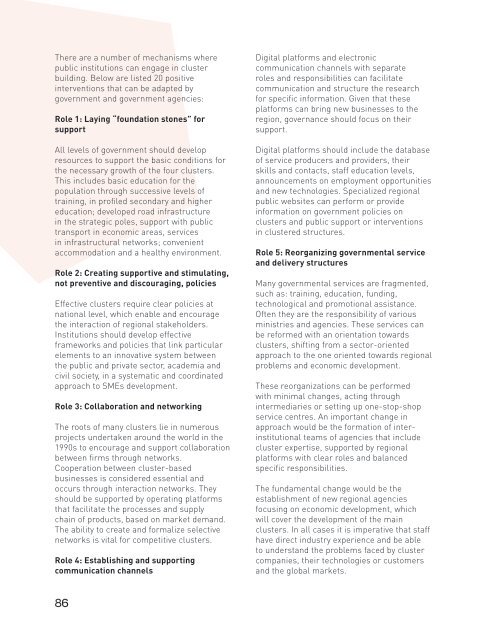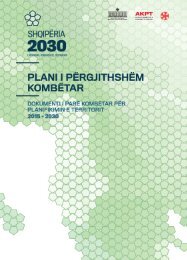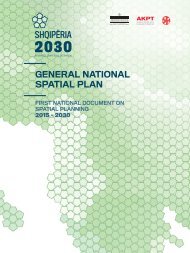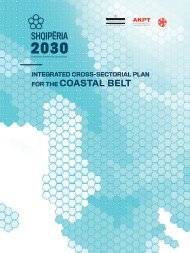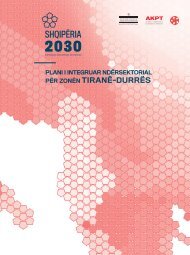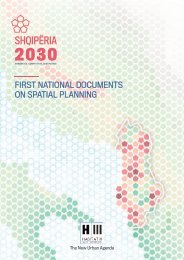Integrated Cross-Sectorial Plan of Tirana-Durres Area
The Albanian Government and the National Spatial Plan have identified the Tiranë-Durrës area, as one of the most important economic areas of the country, and of the Balkan region. To ensure a sustainable territorial and urban development of this area, the Ministry of Urban Development in cooperation with the National Territorial Planning Agency has taken the initiative to draft a Cross-sectoral Integrated Plan for the economic area Tiranë – Durrës. The metropolitan region under study includes territories administered by 5 municipalities: Tiranë, Durrës, Vorë, Shijak, Kamëz.
The Albanian Government and the National Spatial Plan have identified the Tiranë-Durrës area, as one of the most important economic areas of the country, and of the Balkan region. To ensure a sustainable territorial and urban development of this area, the Ministry of Urban Development in cooperation with the National Territorial Planning Agency has taken the initiative to draft a Cross-sectoral Integrated Plan for the economic area Tiranë – Durrës. The metropolitan region under study includes territories administered by 5 municipalities: Tiranë, Durrës, Vorë, Shijak, Kamëz.
Create successful ePaper yourself
Turn your PDF publications into a flip-book with our unique Google optimized e-Paper software.
There are a number <strong>of</strong> mechanisms where<br />
public institutions can engage in cluster<br />
building. Below are listed 20 positive<br />
interventions that can be adapted by<br />
government and government agencies:<br />
Role 1: Laying “foundation stones” for<br />
support<br />
All levels <strong>of</strong> government should develop<br />
resources to support the basic conditions for<br />
the necessary growth <strong>of</strong> the four clusters.<br />
This includes basic education for the<br />
population through successive levels <strong>of</strong><br />
training, in pr<strong>of</strong>iled secondary and higher<br />
education; developed road infrastructure<br />
in the strategic poles, support with public<br />
transport in economic areas, services<br />
in infrastructural networks; convenient<br />
accommodation and a healthy environment.<br />
Role 2: Creating supportive and stimulating,<br />
not preventive and discouraging, policies<br />
Effective clusters require clear policies at<br />
national level, which enable and encourage<br />
the interaction <strong>of</strong> regional stakeholders.<br />
Institutions should develop effective<br />
frameworks and policies that link particular<br />
elements to an innovative system between<br />
the public and private sector, academia and<br />
civil society, in a systematic and coordinated<br />
approach to SMEs development.<br />
Role 3: Collaboration and networking<br />
The roots <strong>of</strong> many clusters lie in numerous<br />
projects undertaken around the world in the<br />
1990s to encourage and support collaboration<br />
between firms through networks.<br />
Cooperation between cluster-based<br />
businesses is considered essential and<br />
occurs through interaction networks. They<br />
should be supported by operating platforms<br />
that facilitate the processes and supply<br />
chain <strong>of</strong> products, based on market demand.<br />
The ability to create and formalize selective<br />
networks is vital for competitive clusters.<br />
Role 4: Establishing and supporting<br />
communication channels<br />
Digital platforms and electronic<br />
communication channels with separate<br />
roles and responsibilities can facilitate<br />
communication and structure the research<br />
for specific information. Given that these<br />
platforms can bring new businesses to the<br />
region, governance should focus on their<br />
support.<br />
Digital platforms should include the database<br />
<strong>of</strong> service producers and providers, their<br />
skills and contacts, staff education levels,<br />
announcements on employment opportunities<br />
and new technologies. Specialized regional<br />
public websites can perform or provide<br />
information on government policies on<br />
clusters and public support or interventions<br />
in clustered structures.<br />
Role 5: Reorganizing governmental service<br />
and delivery structures<br />
Many governmental services are fragmented,<br />
such as: training, education, funding,<br />
technological and promotional assistance.<br />
Often they are the responsibility <strong>of</strong> various<br />
ministries and agencies. These services can<br />
be reformed with an orientation towards<br />
clusters, shifting from a sector-oriented<br />
approach to the one oriented towards regional<br />
problems and economic development.<br />
These reorganizations can be performed<br />
with minimal changes, acting through<br />
intermediaries or setting up one-stop-shop<br />
service centres. An important change in<br />
approach would be the formation <strong>of</strong> interinstitutional<br />
teams <strong>of</strong> agencies that include<br />
cluster expertise, supported by regional<br />
platforms with clear roles and balanced<br />
specific responsibilities.<br />
The fundamental change would be the<br />
establishment <strong>of</strong> new regional agencies<br />
focusing on economic development, which<br />
will cover the development <strong>of</strong> the main<br />
clusters. In all cases it is imperative that staff<br />
have direct industry experience and be able<br />
to understand the problems faced by cluster<br />
companies, their technologies or customers<br />
and the global markets.<br />
86


